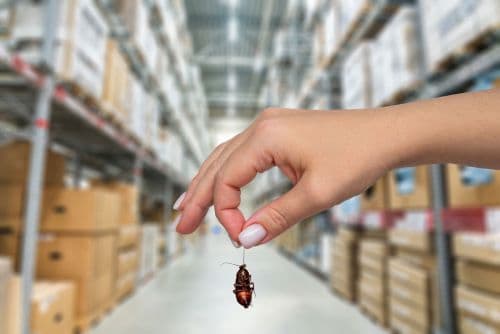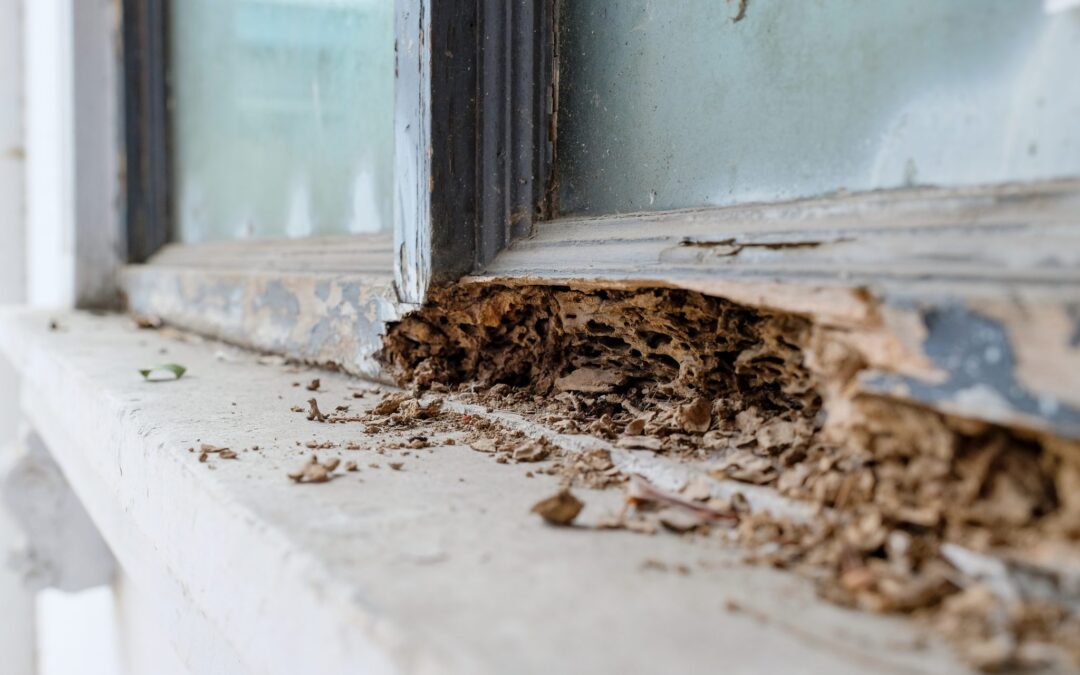READY TO GET STARTED?
REQUEST A FREE ESTIMATE
Fill out the form below or call (888) 466-7849 for a free, no-obligation estimate.

Every business wants to maintain a clean, protected, and pest-free environment. But when rodents, insects, or other unwelcome pests show up, the consequences can range from property damage to serious health risks. For commercial properties, where large foot traffic and reputations are at stake, professional pest control becomes not just a choice—but a necessity. Here, we’ll discuss the top 5 benefits of hiring commercial exterminators and why this investment ensures long-term peace of mind for your business operations.
Commercial pest control focuses on managing and eliminating pests in business spaces such as offices, restaurants, warehouses, and retail stores. Unlike residential pest control, it often involves more complex strategies tailored to the unique challenges of larger or industrial properties.
With the help of commercial exterminators, businesses benefit from the expertise, tools, and preventative measures needed to tackle pest problems efficiently and effectively.
One of the primary reasons to hire a commercial pest control expert is their extensive specialized knowledge in pest management for business environments.
Pests behave differently depending on their species, the environment, and access to resources. Commercial exterminators are trained to identify pest infestations quickly, understand their breeding and feeding patterns, and implement targeted solutions.
For example, cockroaches tend to infest food-preparation areas, while rodents may invade storage units in search of nesting spaces. Recognizing these patterns allows exterminators to eliminate the issue before it escalates.
Another advantage is the ability of commercial pest control companies to adapt solutions to specific industries. Whether it’s using nontoxic food treatments for restaurants, eco-friendly chemicals for retail spaces, or fumigation techniques for warehouses, exterminators have the tools to meet industry-specific needs.
Every business is unique, and so are its pest control needs. A professional pest control service offers customized solutions that cater to your specific requirements.
No two commercial spaces are alike. Pest control providers assess your property, identify risks, and design a comprehensive plan that ensures optimal protection. By addressing vulnerabilities like cracks, entry points, or environmental conditions that attract pests, these tailored solutions protect your property better than one-size-fits-all approaches.
Running a business means minimizing disruptions, especially during peak hours. Reputable commercial pest control providers work around your schedule, offering after-hours or weekend treatments to ensure your operations continue uninterrupted.
Dealing with pests in a commercial setting isn’t just a matter of aesthetics; it’s about maintaining a healthy environment and adhering to local health regulations.
Many industries, such as food service and healthcare, have strict rules about pest control compliance. Failure to meet these regulations can result in fines, citations, or even forced closures. Commercial exterminators ensure that your business follows all guidelines, keeping you compliant with federal, state, and local standards.
Pests can compromise health by spreading diseases, contaminating food, or triggering allergic reactions among employees and customers. Regular pest management not only prevents these hazards but also reassures your stakeholders that their well-being is your priority.
Effective pest control isn’t just about removing current infestations; it’s about preventing them from returning. Professional pest control services help with long-term strategies that save businesses time, stress, and money.
Commercial pest experts provide regular inspections to detect early signs of pest activity. They implement proactive measures to control potential infestations before they escalate, giving you peace of mind that your property is constantly monitored.
Imagine a video of a rodent scurrying across your restaurant floor going viral on social media. Even one pest in your commercial space can lead to bad reviews, loss of customer trust, and a damaged reputation. Preventative pest management ensures such scenarios don’t occur, protecting your brand’s reputation while fostering customer loyalty.
While hiring professional pest control may feel like an added expense at first glance, it is often the most cost-effective approach in the long run.
Left unaddressed, pests can cause significant damage to your property, inventory, and infrastructure. Rodents can chew through electrical wiring, leading to costly repairs. Termites can compromise wood structures, which may require extensive restoration. Commercial exterminators mitigate these risks before they lead to substantial financial losses.
DIY pest control methods often fall short, addressing surface-level issues rather than the root cause. Professional exterminators provide reliable and thorough treatments, ensuring you get the most value for every dollar spent.
By preventing recurring infestations, minimizing repair costs, and protecting your revenue from disruptions, a professional pest control service pays for itself over time.
Pest problems can harm your business’s reputation, well-being, and bottom line. Hiring a professional commercial pest control service not only eliminates these risks but also brings peace of mind by delivering reliable, tailored solutions.
With expertise across industries, compliance support, long-term prevention strategies, and cost-effective results, professional pest control is an investment that ensures your commercial property remains pest-free.
When pests invade, don’t leave your business vulnerable. Protect your employees, customers, and reputation by partnering with trusted pest control experts today. Give us a call or click the button below to get started with your FREE commercial pest control quote.

Living in Fort Myers, Florida, means enjoying year-round sunshine and lush, tropical surroundings. Unfortunately, the warm, humid climate also makes it a magnet for mosquitoes. These relentless pests can turn a pleasant evening outdoors into an unpleasant experience. Worse yet, mosquitoes are more than just a nuisance; they can carry diseases like West Nile virus and dengue fever. Thankfully, eco-friendly and effective mosquito control methods are available to help reduce mosquito problems. By understanding mosquito challenges unique to Fort Myers and exploring environmentally responsible solutions, you can reclaim your outdoor spaces.
Fort Myers’ climate provides an ideal environment for mosquitoes to thrive, especially during the rainy season when standing water accumulates. These pests breed in stagnant water and can populate quickly. From backyard ponds to clogged gutters, even the smallest source of water can lead to an infestation. This is why staying proactive is essential to managing mosquito activity around your home or yard.
While it’s impossible to eliminate mosquitoes entirely, small actions can make a significant impact in minimizing their presence. Here are a few practical ways to deter mosquitoes from taking over your property:
These steps provide a foundation for managing mosquito populations, but sometimes they aren’t enough to fully address larger infestations. That’s when advanced mosquito control approaches can be most effective.
One highly effective and eco-friendly mosquito control method is the In2Care Mosquito Trap System. This innovative system offers a green, alternative approach to managing mosquitoes without relying on traditional sprays. Here’s how it works:
The trap lures mosquitoes into a specially designed system containing a solution that attaches to their legs. When the mosquitoes leave the trap, the solution is carried to other breeding sites, interrupting the mosquito life cycle by eliminating both larvae and adult mosquitoes.
The system can be strategically set around your property to provide consistent reduction of mosquito populations. It’s a great option for anyone seeking an eco-conscious, long-term mosquito management strategy — especially when paired with green mosquito treatments for ultimate protection.
Don’t allow mosquitoes to disrupt your enjoyment of the outdoors. A combination of proactive steps, like reducing breeding grounds, and advanced tools such as the In2Care system, can help you regain control of your yard. Whether you’re looking to implement small changes or a comprehensive mosquito control plan, using environmentally responsible solutions can make a noticeable difference in reducing mosquito activity.
By taking action now, you can enjoy the beautiful outdoor lifestyle Fort Myers has to offer without the constant annoyance of mosquitoes! Reach out to your local Florida pest control company for a free mosquito inspection to get started! Give us a call or click the button below to get started.

Pests in your business can lead to financial losses, harm your reputation, and disrupt operations. Proactive commercial pest control is critical to managing these issues and protecting your bottom line. Here’s how pests impact businesses and actionable tips to prevent them.
Rodents damage wiring, termites weaken wooden structures, and insects contaminate products, leading to costly repairs and replacements. For industries like food service, pests can result in product recalls or waste.
A pest sighting can harm customer trust and generate bad reviews. Restaurants, hotels, and retail stores are especially vulnerable to reputational risks.
Infestations often lead to shutdowns or lost productivity. Employees may feel uncomfortable working in pest-infested spaces, further affecting efficiency.
Pests can cause non-compliance with health and safety standards, leading to fines or closures, particularly in food or healthcare industries.
Hire commercial pest control services for tailored solutions, regular monitoring, and long-term prevention. Professional pest control companies implement cost-effective pest management strategies that save money over time.
Implementing proactive pest control minimizes repair costs, operational downtime, and loss of inventory. It helps businesses maintain compliance with industry regulations, preserve customer trust, and reduce financial risks associated with pest problems.
By staying ahead of pest issues, you protect both your property and profits. Don’t wait for an infestation to hit. Take preventative action today with effective commercial pest control solutions.
Give us a call or click the link below to get started with a FREE commercial pest control quote!

Summer in Miami means sunshine, ocean breezes—and unfortunately, pests. The city’s warm, humid climate is the perfect environment for ants, mosquitoes, cockroaches, and rodents to thrive. But instead of relying on harsh chemicals, you can take a greener, more sustainable approach to keep pests out. Let’s take a look at some green pest control tips to use this summer.
Miami’s heat and humidity, along with frequent rain, create ideal conditions for pests. Standing water attracts mosquitoes, while food and shelter draw in roaches and ants. Staying pest-free means taking proactive, eco-friendly steps to protect your home and the environment.
Cleanliness is the foundation of a pest-free home. By removing food and water sources, you can drastically reduce the chances of pests moving in.
Pests often find their way inside through tiny cracks and gaps. Blocking these entryways is essential.
Green repellents are just as effective as chemical-based ones without the environmental impact.
Mosquitoes require standing water to breed, making it crucial to eliminate these areas on your property.
A well-maintained yard makes it harder for pests to find shelter near your home.
By choosing eco-friendly pest prevention methods or partnering with green pest control experts, you protect your Miami home from summer pests while contributing to a healthier environment. These pest control practices reduce your reliance on harmful chemicals, protect local wildlife, and make your home healthier for family members and pets.
A bit of effort and a green approach can keep your summer pest-free and stress-free. Start today and enjoy the season without worrying about unwelcome guests! Give us a call or click the button below to schedule your FREE green pest control quote!

Drywood termites may be small, but their impact on Tennessee homes can be massive. These pests burrow deep into wood, causing hidden structural damage that weakens your property and reduces its market value. Left unchecked, they can lead to costly repairs, hurt resale prospects, and threaten your home’s health. Here’s how to protect your investment.
Unlike subterranean termites, drywood termites don’t need soil to survive. They infiltrate timber in walls, floors, and furniture, often going undetected until damage is severe. The long-term consequences include:
Detecting drywood termites early can save you thousands. Watch for:
Preventative measures are your best defense. Follow these steps:
For a greener solution to infestations, try:
Don’t underestimate the cost of inaction. Drywood termites threaten your Tennessee home’s value and overall health. Act early to spot infestations, prevent damage, and keep your property market ready. Consult pest control professionals to ensure your home remains a secure and termite-free investment.
Ready to get started? Give us a call or click the button below for your FREE termite control quote!